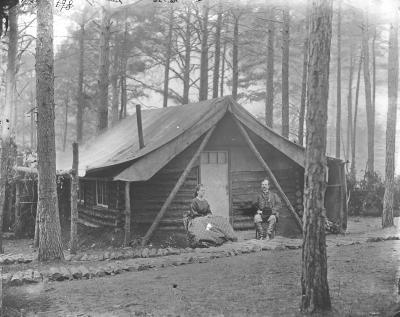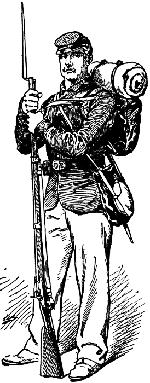The David Whitney Story
Part II – Chapter 5
David's Military Service
Section 5
The 10th Vermont Regiment
A Second Tour of Duty
The 10th Regiment in Northern Virginia
The 10th Vermont Regiment, following reassignment during the build-up to the Battle at Gettysburg in late June 1863, became part of the 1st Brigade, 3rd Division, 3rd Army Corps of the Army of Potomac. After recrossing the Potomac River into Virginia in pursuit of Confederate forces fleeing Pennsylvania through Maryland, the 10th was stationed for six weeks, beginning August 1, in southern Fauquier County, Virginia, just above the Rappahannock River at Routt's Hill, west of Bealeton.
The 10th Regiment got its first genuine taste of combat late that fall when Union forces crossed the Rapidan River and the 10th faced off with the enemy at Orange Grove as part of a campaign along the Mine Run in Orange County. The 3rd Division's 1st Brigade was placed in an offensive position at the right in a charge against a location known as Robertson's Tavern. The 10th was in the center of this charge and led the skirmish there on November 27th: the battle was intense but inconclusive. With winter setting in, the 10th Vermont Regiment was moved back to a position between the Rapidan and Rappahannock Rivers at Brandy Station in Culpeper County.
David Whitney's brother Alonzo and their brother-in-law, Alpheus Cheney, were still serving with the 10th Regiment when it originally set up operations in northern Virginia, but before long, both of them were headed for other assigments. In August Alonzo was assigned duty with a field hospital, and in September Cheney left the 10th Regiment completely to accept a commission as an officer with the newly forming African-American units.
David's Re-enlistment and Mustering In
After arriving back in Brookfield in August, 1863, David remained there long enough to celebrate Thanksgiving and Christmas that year with his family. But on December 26 he rejoined the Union forces by signing up for a three-year tour. David was recorded as being a 19-year-old farmer, with a light complexion, blue eyes, and brown hair, and standing 5' 5-3/8" tall.
On New Year's Day, 1864, David found himself once again in Brattleboro, Vermont, preparing to go off to war near the nation's capital. He was mustered in on January 2nd and assigned to Company G of the 10th Vermont Regiment, the unit his brother and brother-in-law had been serving in.
Returning to the War Zone
By mid-January, 1864, those assigned to the 10th Regiment—including the re-enlistees as well as fresh recruits who had also assembled at Brattleboro—had shipped out and reached their new unit's camp at Brandy Station, Virgina. The recruits new to military service were drilled in preparation for combat, but veterans, like David, who had been trained the previous year and had served in combat zones, were allowed to forego the new training.
As with his previous experience with the 15th Regiment at various camp sites in northern Virginia, David was required to do picket duty defending the camp perimeters, but there was a generous amount of time off in between picket duty and a few other formal functions. Wives and lady friends of some of the officers had been present at the camp for Thanksgiving and New Year's, and on January 25th the 3rd Corps Commander hosted a grand ball attended by 10th Regiment officers and their ladies.

Image from Library of Congress Collection
A Lady with a Union Officer at Brandy Station, VAFebruary 1864
A Diversionary Skirmish, Followed by a Mud Race
On February 6th, as the 10th Regiment was coming back to camp from picket duty, the Union Army's 1st and 2nd Corps were setting up along the Rapidan River as a diversionary tactic for a Union invasion toward Richmond further south in Virginia. The 1st Brigade of the 3rd Division of the 3rd Corps, including David's regiment, was ordered to support the 1st Corps, and marched seven miles in drizzling rain before reaching their position for bivouacking overnight.
In the morning, the brigade proceeded a few more miles to the river, where they found some skirmishing between the 1st Corps and Confederate sentries. The 1st Brigade stood at the battle line all day before it was ordered back to Brandy Station. David's regiment raced the rest of the brigade back to camp after dark, slogging through deep mud. Half of its members were the first to return to their home post that night, beating the 1st Brigade's other two regiments there.
Reorganizing for a Spring Offensive
At the end of February there were signs in the Brandy Station encampment of the beginning of an anticipated spring offensive. The Union's 6th Army Corps moved past David's unit on the way to the Rapidan River south of the encampment. The 6th Corps was to be ready to fight against Confederate troops positioned in defense there, the area where three weeks earlier the 10th Regiment was sent temporarily to back up a brief skirmish.
Early in March, the 3rd Corps, to which the 10th Vermont Regiment belonged, was dissolved and its component units reallocated in a major realignment of Union forces. This was a strategic move for the purpose of conducting an offensive against the Confederate Army of Northern Virgina which has been called the Overland Campaign. The 3rd Corps' 3rd Division, including David's regiment, was reassigned to the Union's 6th Army Corps. The brigade the 10th Regiment was a part of was expanded by the addition of two infantry regiments to its previous structure of three infantry regiments and one heavy artillery regiment.
Private David Whitney now belonged to the 10th Vermont Regiment in the 1st Brigade of the 3rd Division of the 6th Army Corps in the reorganized Army of the Potomac and later, for a brief period, also in the newly incorporated Army of the Shenandoah, Middle Military Department. He served in these commands through many bloody battles until his last day of combat duty at the very end of the war.
Anticipating the Overland Campaign
The Overland Campaign towards Richmond, Virginia, did not start immediately, however, and a large part of the 10th Regiment's time from March through the month of April was spent on the picket line at various locations in Culpeper County, often under considerable rain.
In mid-March, David's Company G also was required to drill four hours a day. On Tuesday, March 15th, the new 6th Corps held a general inspection and, the next day, a corps review. The review was a formal parade of the entire corps, including its infantry, cavalry, and artillery units, plus the wagon trains and ambulances supporting these combat elements. The soldiers were dressed in full uniform to march before their commanding generals, and a rumor spread through the Corps that President Lincoln also had attended the review.
During the next week, reminders of Vermont arrived at the camp in Virginia. A winter storm on Tuesday, March 22nd, dumped an estimated 12 inches of snow on Culpeper County, which delayed the plans of some of the Vermonters there to tap for sugar in their area. However, some of the men received maple sugar from home wrapped in newspapers sent from Vermont.
Final Preparations for the Spring Offensive
In mid-April, orders started coming down through the Union chain of command signalling an imminent beginning to the planned offensive pushing south across the state of Virginia. A final Corps review was conducted on April 18th. April 25th was set as the date mail delivery to and from military units would be halted for at least a 30-day period. Non-standard clothing items were sent for storage in Alexandria, Virginia. Field hospitals in northern Virginia were taken down, and patients were transferred to other facilities in Washington.
On May 3rd, David's unit was ordered to be ready to march the next morning at 4:00am. Each man had been issued 3 days of rations and 50 rounds of ammunition.
Combat-Ready Union Infantryman

Image from FCIT Clipart Collection.
In the early morning of May 4th, the 10th Vermont Regiment set out as ordered and crossed the Rapidan River at Germanna Ford on their way to battle for the territory immediately in front of them.
©2007 by Thomas Lee Eichman. All rights reserved.